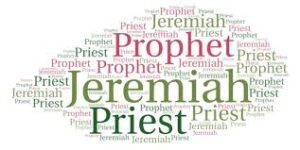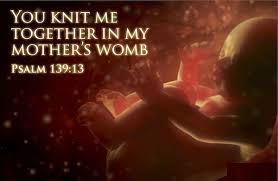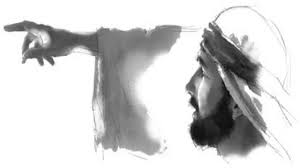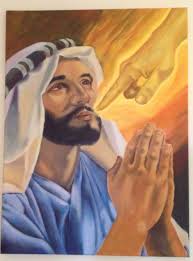The Call of Jeremiah
1: 4-19
The call of Jeremiah DIG: How do you think the word of ADONAI came to Jeremiah? How far back does God’s relationship with Jeremiah go? How involved was YHVH in preparing Yirmeyahu (Jeremiah)? How does God’s call make the prophet feel? How old is Jeremiah? What does HaShem say to Jeremiah to confirm his call? What did He do to him? What two object lessons did ADONAI give him? Upon what pun does the first depend? What does the second mean? Why is the LORD going to punish His people? What opposition will Yirmeyahu face in his ministry? What does he need to overcome it? What does ADONAI promise to do for him? How does Jeremiah’s call compare to Ezekiel’s call?
REFLET: It is evident from Scripture that people hear God when He speaks. I don’t think we have to insist it was in the same way that Samuel heard Him. How do you hear ADONAI? Is it a still small voice like Elijah (First Kings 19:12)? Or do you hear Ha’Shem through Scripture? Are His plans for you always clear, sometimes clear or never clear? When have you sensed the LORD being with you during times of trouble? How do you feel knowing YHVH is watching you? Frightened? Secure? Why? Do you ever plead inadequacy in order to avoid getting involved with what God has called you to do?
627 BC during the reign of Josiah
“I am not made for perilous quests,” cried Frodo. “I wish I had never seen the Ring! Why did it come to me? Why was I chosen?” “Such questions cannot be answered,” said Gandalf. “You may be sure that it was not for any merit that others do not possess; not for power or wisdom, at any rate. But you have been chosen and you must therefore use such strength and heart and wits as you have.”
J. R. R. Tolkien, Fellowship of the Ring 15
For every believer, the concept of a divine call should be basic to the understanding of our faith. The call of Abram (see the Genesis, to see link click Dt – I Will Bless Those Who Bless You and Whoever Curses You I Will Curse) at the beginning of patriarchal history is the pivotal event referred to by Stephen at the beginning of his speech to the Great Sanhedrin (see the commentary on The Life of Christ Lg – The Great Sanhedrin) in Acts 7.
Adherents of all other religions are asked to reach out to God, but the Bible describes God as reaching out to us, searching for us, calling us. Elsewhere the direction of the call is from down upward, as people seem to touch God in their own strength and through their own devices, building towers of Babel in uninvited attempts to storm the strongholds of heaven. But in Scripture the direction of the call is reversed. The call begins in the heavens and moves down to mankind. That that difference alone is enough to expose every man-made-religion as diametrically opposed to biblical faith. The call of each prophet or deliverer in the TaNaKh occurred in a historical context that was usually precipitated by a national crisis. For Moshe it was the Egyptian crisis, for Gideon it was the Midianite crisis, and for Jeremiah it was Babylonian crisis that was destined to bring the kingdom of Judah to ruin.16
About ten years before the death of Manasseh – the most wicked king ever to sit on Judah’s throne – a fateful event took place in the land of Judah. There was nothing spectacular about it, and no one at the time could have recognized its profound significance for the nation. The event was the birth of a male child in the house of Hilkiah, one of the priests of Anathoth, a little town located slightly more than an hour’s walk northeast of Jerusalem in the territory of Benjamin.
The boy was preordained by God to become one of the greatest prophets of Isra’el in the TaNaKh, but at the time his father knew nothing of that. He decided to give his son the relatively common and lackluster name of Yirmeyahu.
The early years of Jeremiah’s life were crucial politically for Judah. Manasseh died in due course, and when, after only two years of rule, Amon, Manasseh’s son and successor, was murdered by palace servants, the assassination must have left its mark on the impressionable mind of the young Yirmeyahu.
With the accession of good King Josiah, however, the boy lived out the rest of his teenage years in a fair degree of peace and serenity. But “a boy’s will is the wind’s will, and the thoughts of youth are long, long thoughts.” Jeremiah was pleased with the religious situation as he found it in his hometown. His father was a priest of ADONAI, which made Jeremiah a “PK,” a “priest’s kid,” the equivalent of the modern-day “preacher’s kid.”

The priest from Anathoth turned out so well in later life that his father must have been the kind of man in whose word “discipline” loomed large. Hilkiah doubtless taught his son the Ten Commandments, and to love ADONAI his God with all his heart and with all his soul and with all his strength (Deuteronomy 6:5), and to love his neighbor as himself (Leviticus 19:18), and not to walk in the step of the wicked or stand in the way that sinners take or sit in the company of mockers (Psalm 1:1).
The stern and dignified and unyielding character of Yirmeyahu’s later life assures us, from the human standpoint, that his father had learned the secret of disciplining him in love. Fond memories of those early years in his home must have strengthened Jeremiah and given him solace and comfort as he went about the difficult task that ADONAI commissioned him to perform. And what was that task? Yirmeyahu was to be a spokesman for God.
As a young man, Jeremiah had seen many of the evil results of pagan worship, and he perhaps longed to do something to foster and further the worship the God of his father’s. But we can be sure that he had no idea of the fearful responsibility the LORD was about to place on his shoulders.16 I like to think that, like his earlier kinsman Moshe, Yirmeyahu received his commission and made his commitment in a quiet retreat, far from the hustle and bustle of the city. When Moses received his call it was on the far side of the desert near the burning bush, at Mount Sinai. Perhaps with Jeremiah it was in a similar place. But as far as we know, the appearance of YHVH to His prophet was not nearly so spectacular as it had been to Moshe; there was no burning bush or other startling visible phenomenon.
Although Yirmeyahu did not see or feel anything, at least not at first, he heard the voice of the LORD speaking. The prophet would later write: The word of ADONAI came to me, using four verbs of calling. The four verbs all have I (ADONAI) as their subject and the suffix you (Jeremiah) as their object. God said: Before . . .

I formed you in the womb: you are mine by virtue of creation. The verb form is regularly used to describe the work of a craftsman, especially a potter (18:1-6), and Genesis 2:7 comes to mind: Then ADONAI, God, formed a man (Hebrew: adam) from the dust of the ground (Hebrew: adamah) and breathed into his nostrils the breath of life, so that he became a living being. Creation by God was an element in the call of Jeremiah, who was thereby predestined to the prophetic office before he was born. The verb formed is assumed by the other three verbs and serves as the vital pedestal on which they stand.
I formed you in the womb, I knew you: you are mine by choice. This turns everything we ever thought we knew about God around. We think that God is an object about which we have questions. We are curious about YHVH. We make inquiries about Him. We read books about God. We get into deep theological discussions about ADONAI. We drop into shul or church from time to time to see what is going on with God. We indulge in an occasional sunset or symphony to cultivate a feeling of reverence for YHVH. But that is not the reality of our lives with God. Long before we ever got around to asking questions about the LORD, He has been questioning us. Long before we got interested in the subject of God, He subjected us to the most intensive and searching knowledge. Before it ever crossed our minds that God might be important, ADONAI singled us out as important. Before we were formed in the womb, God knew us . . . We are known before we know.17
I set you apart: you are mine by virtue of consecration. ADONAI says He set Jeremiah apart. The underlying Hebrew root is usually translated holy, as in Yirmeyahu 2:3, where Isra’el is depicted as holy to the LORD, when she was in the bloom of her youth, early in her history. The words describing someone’s call in the TaNaKh often use the word holy: Moses was told to remove his sandals because the place where he was standing was holy ground (Exodus 3:5), and Isaiah heard seraphs calling to one another, Holy, holy, holy is ADONAI-Tzva’ot (Isaiah 6:3). To approach God’s presence, or to serve Him, one must be made holy, consecrated, set apart or sanctified by YHVH (Exodus 19:14). Jeremiah was set apart that he might be able to prophesy to people who, though once holy, were no longer so.

I appointed you as a prophet to the nations (1:4-5): you are mine by commission. ADONAI says He appointed Yirmeyahu as a prophet to the nations. The underlying Hebrew root is usually translated gave, the meaning appointed is a nuance in the sense of put or placed. In Jeremiah’s case, choice and consecration were followed by commission, a special commission as a prophet to the nations (Chapters 25, 46-51). Far from being restricted to only prophesying to Isra’el, Yirmeyahu’s mission was to be worldwide. Such a divine appointment could not but be expected to produce such a reluctant response . . . a negative response . . . from the priest from Anathoth.
With God in your world, you aren’t an accident or an incident; you are a gift to the world. You are a divine work of art, signed by the Master. Like a famous painter who signs her name at the bottom of a magnificent painting, ADONAI has signed His name on you with the Ruach HaKodesh. He has anointed us, set His seal of ownership on us, and put His Spirit in our hearts as a deposit, guaranteeing what is to come (Second Corinthians 1:21b-22). We are His works of art. We are created in His image to do good deeds. However, we are significant, not because of what we do, but because of who we are.18
Even though Jeremiah had been anxious to do his part, was not Ha’Shem asking a bit too much? How could a priest from Anathoth be a prophet to the nations? What academic credentials could he produce that would qualify him for such a high position? What fame did he possess that would command the attention and respect of the nations? He had two objections.
First, Jeremiah said: Ah (Hebrew: ’aha, a term that expresses dismay or alarm; and even more, actually conveys opposition to divine self-disclosure), Adonai ELOHIM, I don’t even know how to speak (1:6a)! When we hear this, we think of Moshe. At the burning bush Moses had also given his lack of eloquence, his inability to articulate his thoughts with precision, as a reason that he hoped would release him from the responsibility of leading his people out of bondage in Egypt (see the commentary on Exodus Av – I Am Slow of Speech and Tongue). Like Moses, Yirmeyahu was no eager prophet!
Second, he reasoned: I’m just a young man (1:6b)! The Hebrew word naar may mean a child or an infant as we see in Exodus 2:6 and First Samuel 4:21, but it can also mean a young man of marriageable age. The latter, of course, is intended here. Jeremiah may have been in his late teens or early twenties when God called him. Isaiah said: Here am I. Send me (Isaiah 6:8b)! But Yirmeyahu wasn’t quite so anxious, he said, “I’m too inexperienced!” Since wisdom came with experience and age in the ancient world, how could ADONAI expect Jeremiah, as young as he was, to accept such a daunting task?
Centuries later, how could Rabbi Sha’ul expect the young Timothy to set an example for the believers in speech, in life, in love, in faith and in purity (First Timothy 4:12)? Can one suppose that such a young man will flee the evil desires of youth, and pursue righteousness, faith, love and peace, along with those who call on the Lord out of a pure heart (Second Timothy 2:22)?
Yirmeyahu would someday learn not to boast in wisdom, strength, or riches, but rather to boast about his understanding of the LORD and His kindness, justice and righteousness (Jeremiah 9:23-24). But for now his response was characterized by the timid reluctance that usually comes with youth and immaturity.
YHVH’s words of reassurance to Jeremiah not only repeat in essence the content of the divine call but also responded to his twofold objection. Verses 7-9 parallel verses 17-19. And in addition, verses 7-9 echo Deuteronomy 18:18 in such a remarkable way that they assuredly reflect Yirmeyahu’s consciousness of being a prophet like Moshe. Each following verse of the LORD’s reassurance to His prophet is a distinct unit.
Divine authority: But ADONAI said to me, “Don’t say, ‘I’m just a young man.’ You must go to everyone I send you to and say whatever I command you” (1:7). To Jeremiah’s objection that he is just a young man, the LORD responds that He will give him the courage to go to everyone he is sent to. And to Yirmeyahu’s objection that he doesn’t even know how to speak, YHVH responds that He will give him the ability to say whatever he is commanded to. “Never mind that you a merely a young man, I am with you!”
Divine presence: To Jeremiah’s timidity, Ha’Shem responds with the command: Do not be afraid of them, for I am with you and will rescue you, declares the LORD (1:8). The form of reassurance is significant. In his mission Jeremiah will not be free from danger and hardship; but God will be his Rescuer. The latter phrase is repeated in 1:19, a phenomenon evident also in the call of Gideon (Judges 6:12 and 16) and in a profoundly important theological context, the account of the call of Moshe (Exodus 3:12 and 14), where it is linked to the most intimate form of the divine name: I AM Who I AM.
The readers of Yirmeyahu would be able to see themselves and their recent history as the key reason for Jeremiah’s call. The prophet was called because of them! The readers are the “them” of verse 8, when God said: Don’t be afraid of them! They are the ones who threatened God’s prophet and from whom he must be rescued (1:18-19). The readers are those who worshiped other gods and became the object of God’s judgment in and through other nations (1:15-16). With this visionary introduction, readers would be able to see more clearly that it was their apostasy that had caused their own judgment. At the same time, Jeremiah’s call holds up a word of hope for them; its subject is ADONAI.19
God, as the great I am, doesn’t intend by that name to teach us about His undeniable existence but to assure us of His gracious, protecting, and permanent presence. As Immanuel, God With Us, He guarantees that He will never leave us or forsake us. Central in the three sentences of divine reassurance, the Immanuel theme is also a central feature of Scripture as a whole. For example, Matthew begins his gospel by presenting Yeshua Messiah as God with us (Mattityahu 1:23) and concludes it by recording Jesus’ words: I am with you always (Matthew 28:20). The Bible begins with ADONAI, God, creating mankind for fellowship (Genesis 1:18, 2:7 and 3:8) and ends with John’s prayer: The grace of the Lord Jesus be with God’s people (Revelation 22:21).

Divine touch: Then ADONAI reached out His hand and touched my mouth and said to me, “I have put My words in your mouth” (1:9). Analogous to the seraphs touching the sinful lips of Isaiah (Isaiah 6:6-7), ADONAI responds to Yirmeyahu’s professed lack of speaking ability by symbolically touching his mouth. The Hebrew word put is literally given, also found in Deuteronomy 18:18 and Jeremiah 5:14 in this sense. God had given Jeremiah to be a prophet to the nations (1:5), so now He had given Yirmeyahu His words of assurance to help him fulfill his divinely ordained mission.20 In other words, “Just go where I tell you and repeat what I say to you. No experience is necessary!”
See, today I appoint you as an overseer over nations and kingdoms to uproot and tear down, to destroy and overthrow, to build and to plant (1:10). Four of the metaphors are verbs of destruction and two metaphors are verbs of restoration. The A–B–C–C–B–A chiasmus provides an explanation for the order of these verbs. The agricultural terms (A) enclose the construction terms (B), which in turn enclose the military terms (C). The first four metaphors are words of judgment on the nations, but the last two are words of salvation. From the beginning, the book of Jeremiah signals that the prophet’s word will not simply be about judgment, however powerful that word will prove to be. No word of judgment will be God’s final word to Isra’el.21
A to uproot,
B to tear down,
C to destroy,
C to overthrow,
B to build,
A to plant.
These verbs anticipate the whole message of Yirmeyahu. The prophet would clearly have preferred to speak about the building and planting, but he did comparatively little of this constructive preaching and a great deal of the destructive kind.22
How did Yirmeyahu make the transition from the shuffling, excuse-making: Ah, God I’m just a young man to the iron pillar career of accepting the assignment of a prophet? God equipped him for life by showing him two visions that led him from inadequacy to obedience.

The vision of the almond tree: As if out on a walk, the word of the LORD came to Jeremiah and said: What do you see, Yirmeyahu? “I see the branch of an almond tree,” he replied. ADONAI said to him, “You have seen correctly, for I AM watching to see that My word is fulfilled” (1:11-12). The almond tree is the first tree to blossom in Isra’el in the spring. When the white blossoms of the almond tree appear, the people know that spring is near. There is a word play, or pun, in the original language. The Hebrew word for watching sounds like the Hebrew word for almond tree. Shaqed means almond. The root of this word means to be awake, to be watchful, or to be alert. It became the name for the almond tree because it is the first shrub to awaken from the winters nap (but the last to bear fruit). The pink buds come out as early as January, with the fruit appearing in March. By that time the white almond blossoms fall like snow all over Isra’el. Shoqed means watching, being stirred to watch, or being awakened to watch.
It is easy to imagine Jeremiah both brooding over the whole issue of YHVH’s message to His people and wondering whether He would make the word come to pass. The prophet felt compelled to speak. Does this word, too, have power? But worrying and agonizing over this terrible question, Yirmeyahu found his attention caught by a glimpse of the almond tree. The glimpse came as an answer to his question, and the answer was in the form of a wordplay or pun. Consequently, when all seems dormant, God is watching, ready to fulfill His word. As spring always follows the blossoming of the almond tree, so ADONAI’s prophetic fulfillment would follow Jeremiah’s prophecies.23
During his long ministry, Yirmeyahu made some near historical prophecies and some far eschatological prophecies. One of the tests of a prophet was to make a near historical prophecy . . . and if that came true then the people could then trust his far eschatological prophecy as well. But if what a prophet proclaims in the name of ADONAI does not come true, that false prophet must be put to death (Deuteronomy 18:14-22). It wasn’t very daring to prophesy something 300 years after your death. So Jeremiah’s prophecies would eventually be fulfilled after a wait of some forty years. He lived in Tziyon when the end came, and he also made some far eschatological prophecies that we can count on. The point is, whatever Jeremiah prophecies, God is watching and will make sure that it is fulfilled because God gave him the prophecy in the first place.

The vision of the boiling pot: Jeremiah’s second vision is not concerned with the power behind the word from Ha’Shem but with the message, the content, of that word. Unfortunately, both what he sees and what it means are difficult to understand. The word of the LORD came to me again, “What do you see?” “I see a pot that is boiling,” I answered. “It is tilting toward us from the north” (1:13). This is the same kind of pot that Jacob was cooking when Esau came in and wanted some of his red stew. But this pot is tilted so that the scalding water was being spilled to the south. The village of Anathoth and the streets and courtyards of Jerusalem were directly in the path of its flow. ADONAI said to me, “From the north disaster will be poured out on all who live in the Land. I AM about to summon all the peoples of the northern kingdoms,” declares Ha’Shem. “Their kings will come and set up their thrones in the entrance of the gates of Jerusalem” (after the fall successive victorious kings will sit in formal judgment at the gates where trials were held, to determine what was to be done with the defeated population and their towns); they will come against all her surrounding walls and against all the towns of Judah (1:14-15).
Then God spells out the reason for the judgment: I will pronounce My judgments on My people because of their wickedness in forsaking Me, in burning incense to other gods and in worshiping what their (the reader’s) hands have made (1:16). The reference to idolatry signals to the reader that the first (see the commentary on Exodus Dk – You Shall Have No Other Gods Before Me) and second commandments (see the commentary on Exodus Dl – You Shall Not Make For Yourselves an Idol) are the key issue for ADONAI. All other sins cited along the way in Jeremiah are symptomatic of this split in the original readers’ relationship with God. Spiritual adultery or unfaithfulness is the most basic metaphor that the LORD will use for this breakup (see At – Unfaithful Isra’el). Yet, such a comment also recognizes the presence of a faithful remnant among the unfaithful majority.
At this point no specific nation is named, and will not be named until much later in the scroll. But the exiled readers of the book of Jeremiah knew exactly who the nation was because they were stuck in Babylon and not living in Judah! The point is that judgment is coming from the north that will destroy the Land. The reason for this judgment is the wickedness of the leadership and people of Isra’el. The rest of the book will merely add more details to these two visions. Yirmeyahu was shaped by the visions, not by the fashions of the day, not by his feelings about himself.
The charge: Yet, Jeremiah could fail (we can say “no” to God and make it stick). For his part, the prophet will need to get ready for battle. So YHVH says: Get yourself ready! Stand up and say to them whatever I command you. Courage, moral and physical, was an essential attribute of the true prophet; Nathan’s fearless accusation of David (Second Samuel 12:7) and Elijah’s undaunted rebuke of Ahab (First Kings 21:19) are examples.
At the same time, God assures Yirmeyahu that he is not alone in this task: Do not be terrified by them, or I will terrify you before them. Today I have made you a fortified city, an iron pillar and a bronze wall to stand against the whole land – against the kings of Judah (36:26), its officials (38:1-28), its priests (26:1-24) and the people of the Land (44:1-30). Jeremiah would, indeed, have to plough a lonely furrow, with all the sections of the nation against him. They will fight against you but will not overcome you, for I AM with you and will rescue you, declares ADONAI (1:17-19). But this is not a word that promises Yirmeyahu a trouble free life; indeed, Ha’Shem’s rescue implies that there will be trouble ahead.
Yirmeyahu was called to prophesy in the darkest hours of Judah, when she died as a nation. He is known as the “weeping prophet,” although a more appropriate name might be the “groaning prophet,” or the “complaining prophet.” Not for his trials, although they were burdensome, but for the sins of his nation and the destruction that was to come. No one else at the time comprehended the full significance of the judgment that awaited Judah. He knew that in a very short time the proud, beautiful city of Tziyon with its magnificent Temple would be in ruins, and his beloved people would be in captivity. He also knew that Isra’el would be exiled from the Land for a long time because of her sin. No wonder he wept.
Where Isaiah was bold and fearless, Jeremiah was gentle and compassionate. Where Isaiah lived more than one hundred years before the captivity of Judah, Yirmeyahu ministered just before and during the final catastrophe. Where Isaiah foretold of judgments that were coming unless the nation turned to God, Yirmeyahu notified the nation that their final judgment was at hand, and that ADONAI had (temporarily) rejected them and that nothing could save them from their punishment.
There does come a point when, to use a boating metaphor, Israel’s disastrous trip over the falls becomes inevitable. The prophet does discern when the pull of the waterfall makes it impossible to prevent the boat from going over, when those on the boat may not realize it (4:28 for example). But the calls for repentance in Jeremiah (3:11 to 4:4) suggest that a disastrous future was not necessarily in place from the beginning.
Indeed, the book of Yirmeyahu has continuing importance for readers then and now precisely because our futures are (normally) not set in stone and because a past word of God regarding repentance may once again prove to be a lively word of possibility. How people respond to the word of God does in fact shape their future, as well as the future of others. At the same time, there may come a point in the course of the lives of individuals or communities or nations when a certain kind of future does become inevitable, when it may be too late for repentance to shape the future in a positive way. But even if this disaster should occur, the remarkable word of Jeremiah is that no trip over the falls is final.
Judah’s God is the kind of God who picks the people up from the rocks below the falls and continues to be about the business of building and planting (1:10) for the future, even when there does not seem to be much left to work with. And, then, in this continuing journey down the river, the call to repentance remains important.24



Leave A Comment